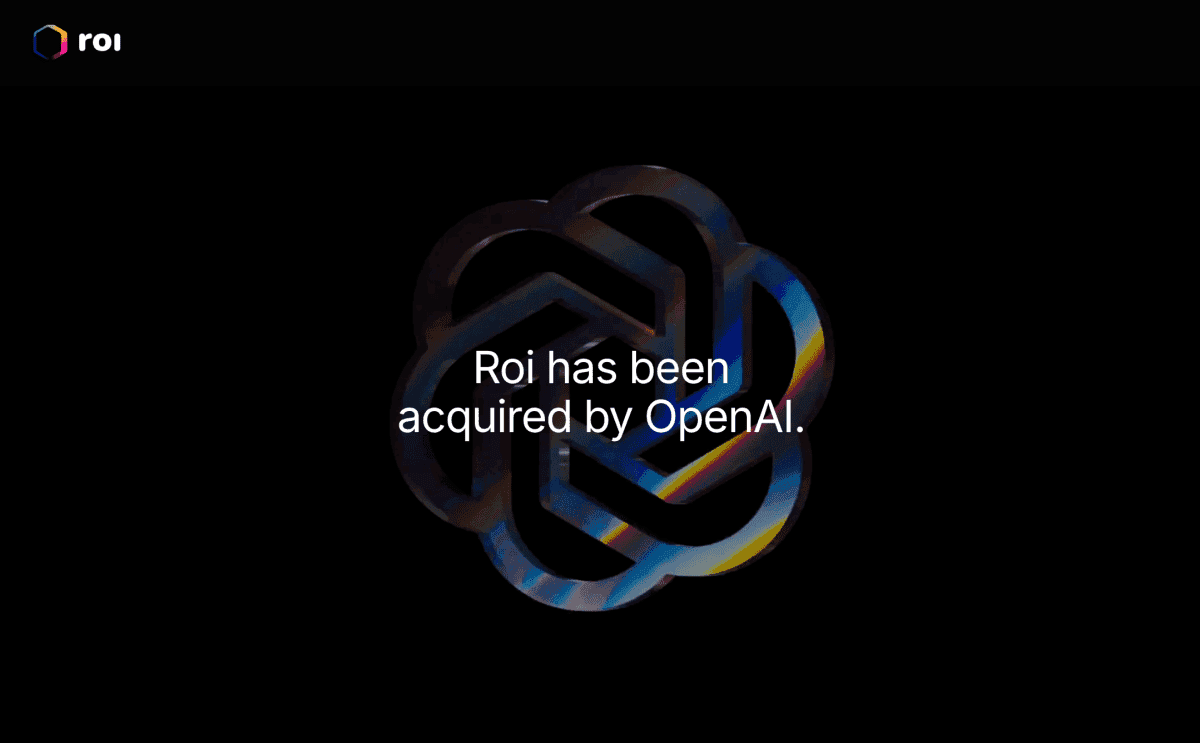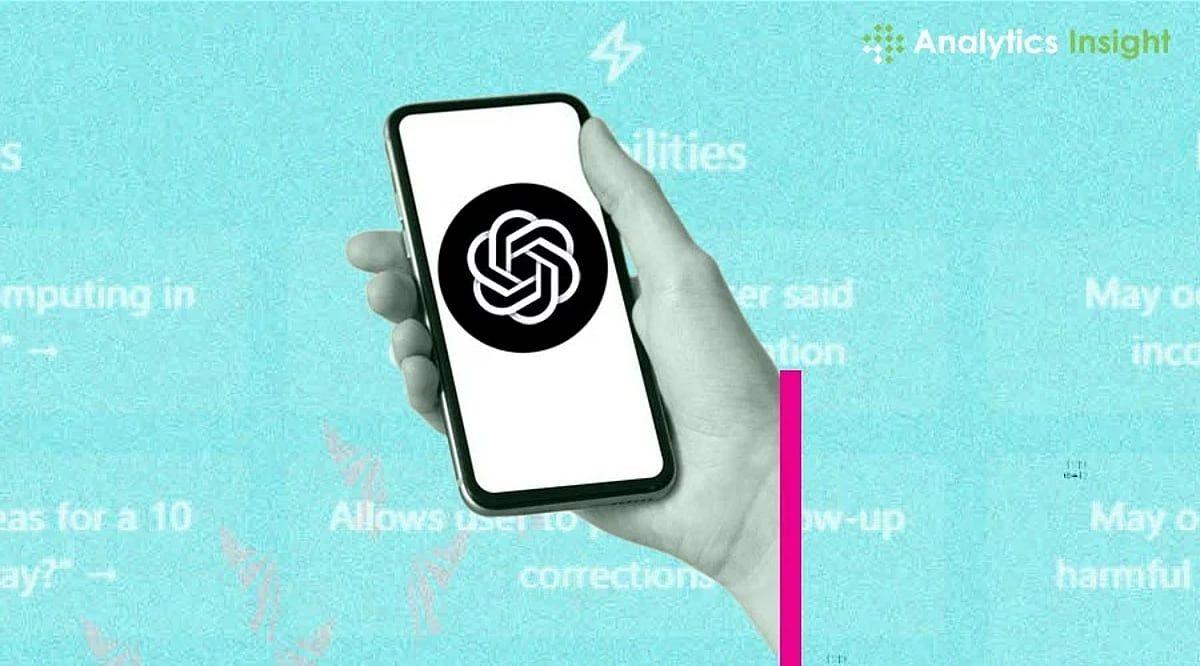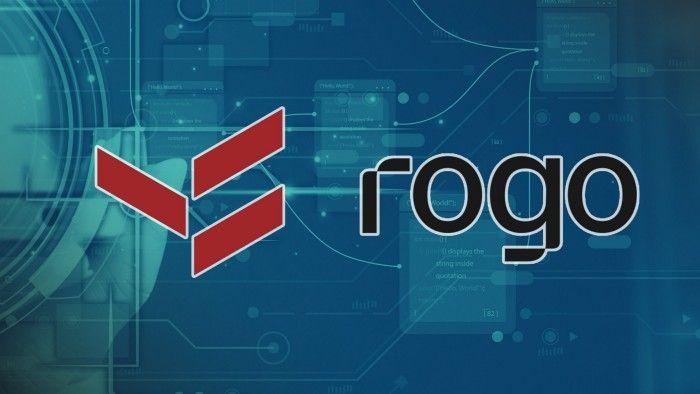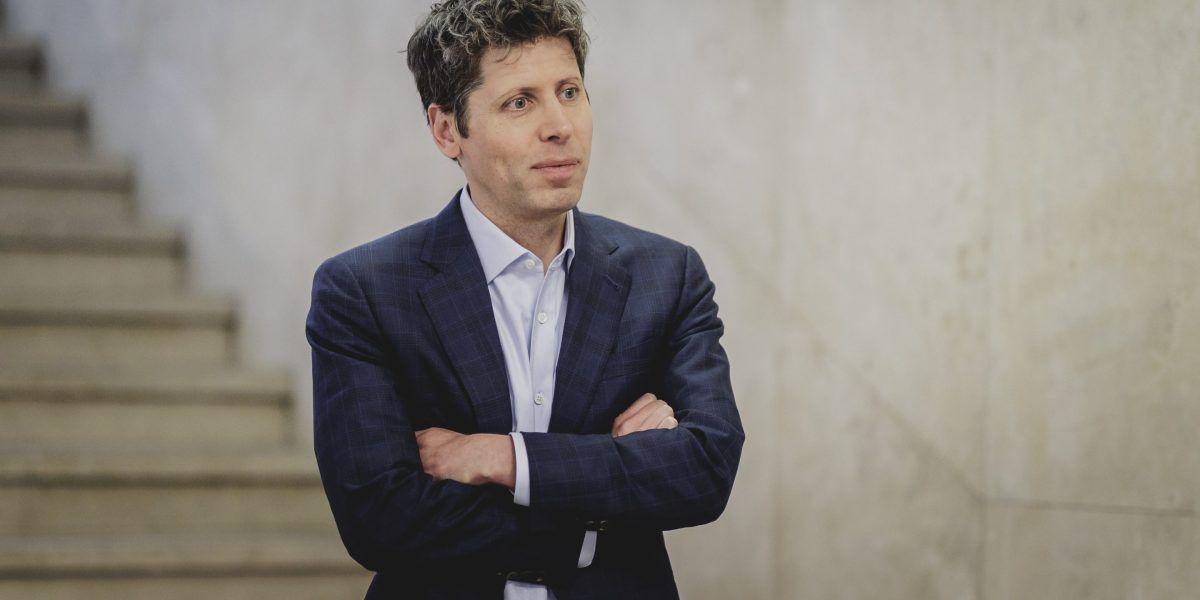OpenAI Acquires AI-Powered Personal Finance App Roi in Strategic Move Towards Personalized Consumer AI
8 Sources
8 Sources
[1]
With its latest acqui-hire, OpenAI is doubling down on personalized consumer AI | TechCrunch
OpenAI has acquired Roi, an AI-powered personal finance app. In keeping with a recent trend in the AI industry, only the CEO is making the jump. Chief executive and co-founder Sujith Vishwajith announced the acquisition on Friday, and a source familiar with the matter told TechCrunch he is the only one of Roi's four-person staff to join OpenAI. Terms of the deal were not disclosed. The company will wind down operations and end its service to customers on October 15. The Roi deal marks the latest in a string of acqui-hires from OpenAI this year, including Context.ai, Crossing Minds, and Alex. While it's not clear whether any of Roi's technology will transfer over to OpenAI or which unit Vishwajith will join, the acquisition clearly aligns with OpenAI's bet on personalization and life management as the next layer of AI products. Roi brings a specialized team that has already tried to solve personalization in finance at scale - a challenge whose lessons can be applied more broadly. New York-based Roi was founded in 2022 and has raised $3.6 million in early-stage funding from investors like Balaji Srinivasan, Spark Capital, Gradient Ventures, and Spacecadet Ventures, according to PitchBook data. Its mission was to aggregate a user's financial footprint, including stocks, crypto, DeFi, real-estate, and NFTs, into one app that can track funds, provide insights, and help people make trades. "We started Roi 3 years ago to make investing accessible to everyone by building the most personalized financial experience," Vishwajith wrote in a post on X. "Along the way we realized personalization isn't just the future of finance. It's the future of software." Beyond tracking trades, Roi gave users access to a financially savvy AI companion that responded in ways that made sense for them. When signing up, users could personalize Roi by providing information like what they do for a living and how they wanted want Roi to respond to them. In one telling example that Roi posted on X, the sample user wrote: "Talk to me like I'm a Gen-Z kid with brain rot. Use as little words as possible and roast me as much as you want I don't mind." In response to a query about the status of the user's portfolio, Roi replied: "Suje, you got cooked lil bro. Cause of the tariff announcements, you took an L today of $32,459.12...Based on your risk preference this might be an opportunity to buy the dip." The exchange highlights the philosophy behind Roi and its co-founder - that software shouldn't just provide generic answers but should adapt, learn, and communicate in ways that feel personal, human, and most importantly, keep you engaged. As the Roi team wrote in a blog post: "The products we use every day won't remain static, predetermined experiences. They'll become adaptive, deeply personal companions that understand us, learn from us, and evolve with us." That vision dovetails with OpenAI's existing consumer efforts, including Pulse, which generates personalized news and content reports for users as they sleep; the Sora app, a TikTok competitor filled with AI-generated content, including personal cameos from users; and Instant Checkout, a feature that lets users shop and make purchases directly in ChatGPT. The deal also comes as OpenAI beefs up its consumer applications team, led by former Instacart CEO Fidji Simo. It's a further signal that OpenAI isn't just trying to be an API provider, but wants to build its own end-user apps. Roi's talent and tech could slot right into these apps and help make them more adaptive. Vishwajith, alongside his co-founder Chip Davis, used to work at Airbnb, where he developed a knack for optimizing user behavior to drive revenue. By his account, a simple change of 25 lines of code led to $10+ million in additional cash. Being able to bring in meaningful revenue via consumer apps is more important than ever to OpenAI as it continues to burn through billions on data centers and infrastructure to power its models.
[2]
OpenAI acquires an AI-powered personal investing app
Just a day after dethroning SpaceX as the most valuable private company in the world, OpenAI has acquired another startup. This time, the AI giant acquired Roi, an app that offers a one-stop shop for all your financial portfolios and an AI chatbot that provides personalized investing advice. Details of the acquisition weren't made public, but TechCrunch reported that Sujith Vishwajith, the startup's CEO and co-founder, will be the only one joining OpenAI's team. It might come as a surprise for OpenAI to venture into the personal finance space, but this latest acquisition offers some hints at what the company could have in store for the future. OpenAI could be leaning into an AI chatbot that provides more than just responses to general queries and offers more personalization as a "proactive assistant," as detailed in its blog post introducing Pulse. OpenAI is also no stranger to acquiring smaller companies that offer something that could advance ChatGPT. In May, the company acquired io, an AI hardware startup cofounded by former Apple designer Jony Ive, for $6.5 billion. OpenAI followed up that major purchase by spending another $1.1 billion to acquire Statsig, a startup that focused on product testing, in September.
[3]
OpenAI Acquires Financial AI Startup Roi to Personalise Investing | AIM
Founded to make investing more accessible, Roi developed AI tools to deliver personalised financial insights and education. OpenAI on October 4, acquired Roi, a startup focused on using AI to personalise investing experiences. The company announced that Roi will wind down its independent operations, with its final day of service set for October 15, 2025. The deal, which is structured as an acqui-hire, will see Roi's co-founder and CEO, Sujith Vishwajith, join OpenAI, while the company's standalone operations will be discontinued. Details of the acquisition, including financial terms, were not disclosed. In a statement, Roi said the acquisition marks an incredible milestone as the team joins OpenAI to build a new generation of software that is personal and transformative. Founded with the goal of making investing more accessible, Roi developed AI tools to deliver personalised financial insights and education. "Every person's financial journey is different, shaped by unique goals, behaviours, and roadblocks," the company said. "With Roi AI, we showed what artificial intelligence could unlock by delivering individually tailored insights, education, and guidance in real time." The company added that its learnings extended beyond finance. "Personalisation isn't just the future of finance, it's the future of software itself," Roi noted, emphasising that future digital products will become "adaptive, deeply personal companions that understand us, learn from us, and evolve with us." OpenAI recently launched ChatGPT Pulse and Instant Checkout, expanding the chatbot into daily updates and shopping. Pulse delivers personalised news, recommendations, and agendas, keeping users informed without prompts, while Instant Checkout lets users browse and purchase products directly within ChatGPT.
[4]
OpenAI acquires AI-powered personal investing app
This content has been selected, created and edited by the Finextra editorial team based upon its relevance and interest to our community. According to TechCrunch, CEO and co-founder Sujith Vishwajith is the only one of Roi's four-person team to make the move to OpenAI as part of the acquisition, terms of which were not disclosed. Roi, which was founded in 2022 and has raised $3.6 million in funding, will wind down by the middle of August. Roi uses AI to offer its users a "personalized financial experience," helping them track and manage their financial footprint as well as providing insight. Neither OpenAI nor Roi have provided any details on how the technology could transfer or what Vishwajith's role will be. On X, he says: "This acquisition marks an incredible milestone for Roi, and we're thrilled to continue building out our vision at OpenAI."
[5]
OpenAI Acquires AI Finance App Roi In CEO-Only Deal As Consumer Products Push Continues - Airbnb (NASDAQ:ABNB), Maplebear (NASDAQ:CART)
OpenAI has purchased Roi, an AI-driven personal finance app, with only the startup's CEO joining the company. The move continues OpenAI's trend of acqui-hires throughout the year. Single-Employee Acquisition Roi's CEO and co-founder, Sujith Vishwajith, announced the acquisition on Friday. According to a source cited by TechCrunch, he is the only member of the four-person Roi team joining OpenAI. The terms of the deal were not disclosed, and Roi will shut down its operations on October 15. OpenAI did not immediately respond to Benzinga's request for comment. Financial Background Roi is a New York-based startup founded in 2022 that raised $3.6 million from investors such as Balaji Srinivasan, Spark Capital, and Gradient Ventures, according to PitchBook. See Also: OpenAI's Sam Altman Turns To Asia, Middle East For Funds Amid Multitrillion-Dollar Push To Build Next-Gen Data Centers The app helped users track and manage their financial assets across stocks, crypto, decentralized finance (DeFi), real estate, and non-fungible tokens (NFTs). "We started Roi 3 years ago to make investing accessible to everyone by building the most personalized financial experience," Vishwajith wrote on X. "Along the way we realized personalization isn't just the future of finance. It's the future of software." Consumer Strategy The acquisition comes after OpenAI's purchase of Context.ai, Crossing Minds, and Alex earlier this year. OpenAI's consumer applications team, led by former Instacart (NASDAQ:CART) CEO Fidji Simo, has launched products such as Pulse for personalized news and Instant Checkout for in-app purchases. OpenAI completed a $6.5 billion acquisition of Jony Ive's AI hardware startup in July. Revenue Focus Vishwajith previously worked at Airbnb (NASDAQ:ABNB), where a 25-line code change he implemented generated over $10 million in additional revenue. Driving consumer revenue is especially important as OpenAI continues to spend billions on infrastructure. Spending is projected to rise to $400 billion by 2029. Read Next: Former Cisco CEO John Chambers Warns AI Market Surge Mirrors Dot-Com Bubble, Predicts Faster Job Displacement, Market Volatility Photo courtesy: Svet foto / Shutterstock.com Disclaimer: This content was partially produced with the help of AI tools and was reviewed and published by Benzinga editors. ABNBAirbnb Inc$120.20-1.06%OverviewCARTMaplebear Inc$38.22-2.75%Market News and Data brought to you by Benzinga APIs
[6]
OpenAI Buys Personal Finance App Roi | PYMNTS.com
"We started Roi 3 years ago to make investing accessible to everyone by building the most personalized financial experience. Along the way we realized personalization isn't just the future of finance. It's the future of software," Vishwajith wrote. "This acquisition marks an incredible milestone for Roi, and we're thrilled to continue building out our vision at OpenAI." According to a report by TechCrunch, the word "we" here applies solely to the CEO, as sources tell that news outlet that he will be the only member of Roi's four-person team moving over to OpenAI. Terms of the deal were not disclosed, and Roi is set to wind down operations and end its service to clients on Oct. 15, the report added. In other news from the intersection of AI and finance, PYMNTS wrote recently about the shift toward "cognitive banking," which refers to embedding AI-driven inferencing and pattern recognition on top of permissioned data (transactions, financial behaviors, linked accounts), allowing banks to "shift from reactive servicing to proactive guidance." Instead of waiting for customers to scroll through menus or submit queries, cognitive banking systems detect intent, flag opportunities, and offer "next-best actions" -- whether that's a liquidity suggestion, a personalized loan offer, or a fraud alert. Research by PYMNTS Intelligence has traced how AI in banking is shifting into its "next era," where conversational interfaces move from simple Q&A bots to tools that can offer strategic insight and contextual counsel. Importantly, the research also shows that 75% of bank customers want more personalization and that embedded conversational AI could win back 72% of bank customers by giving them that tailored experience. "Thus, cognitive banking is not just about automation -- it's about personal relevance, timing and trust," the report added. The shift is already happening, PYMNTS said, with Bank of America recently debuting its AskGPS tool, which lets employees in the Global Payments Solutions unit pose simple to complex client questions and get authoritative answers in seconds. "This breaks from traditional knowledge bases -- it's not just 'search' but inference, context and response," PYMNTS wrote.
[7]
What OpenAI Acquihire of Roi Means for AI in Personal Finance
OpenAI has acquired Roi, a personal finance app, marking another “acqui-hire†move by the company. The deal highlights OpenAI’s growing interest in personalised advice tools. "Roi, known for its expertise in personalised investment advice across stocks, crypto, DeFi, and NFTs, will shut down its consumer app by October 2025, as its team, including CEO Sujith Vishwajith, joins OpenAI", said the press release from OpenAI. For the Indian context, the timing of this deal coincides with SEBI weighing in on the use of AI in the securities markets. Roi, a personal finance app that has been recently acquired by OpenAI, dubs itself as the “ultimate finance appâ€. 100,000+ investors use the app for tracking their net worth, to manage and track all investments and trades and to “copy the trades of famous investorsâ€. Apart from these features, Roi boasts a recently launched AI financial companion feature that is “like ChatGPT†allowing for financial personalisation backed by real-time market data. The users can ask questions such as “Should I invest in Nvidia?†and obtain instant responses backed by real-time market data. The OpenAI-Roi deal follows a string of recent startup acqui-hires by OpenAI, such as the team behind Context.ai, which produced “client-ready decks, models, docs, and emailsâ€; Crossing Minds, which studied the behaviour of customers on e-commerce sites to provide insights on shopping preferences; and Alex, which provided “AI-powered debugging for developersâ€. These acquisitions have been termed “acqui-hires†because members of the founding teams of such startups then join OpenAI, such as Roi’s co-founder, Sujith Vishwajith, joining OpenAI. All these four startups, including Roi, provide personalised solutions, which are of increasing importance for OpenAI in providing more context-specific and accurate solutions to its end users. The expertise of such startups as brought in by their members is likely to help in better product development at OpenAI, as evidenced by Scott-Green from Context AI joining as Product Manager at OpenAI. Roi’s acquisition is of interest as it points to OpenAI’s interests in responding to finance-related questions posed by ChatGPT users. As of now, the response seems to be informative and slightly dated rather than informed by real-time data, which could be where Roi’s manner of responding to user queries proves to be useful. In India, Paytm partnered with Perplexity earlier this year in providing AI-powered search to its users allowing “users to ask everyday questions, explore topics in their local language, and make informed financial decisionsâ€. This collaboration precedes the OpenAI acquisition of Roi and points to a growing trend in the AI world of enabling real-time financial assistance for end-users. In India, these developments intersect with SEBI’s Investment Advisers (Second Amendment) Regulations, 2024 and the consultation paper on responsible AI/ML in securities markets. SEBI has flagged concerns around fairness, accountability, investor protection and data privacy in any AI-driven financial advice. If Roi’s features find a place in OpenAI’s model, it is likely to clash with SEBI’s regulations. PayTM’s partnership with Perplexity deserves further scrutiny so as to ascertain the impact of providing financial advice to users. Such an analysis would allow for potential drawbacks to be proactively addressed by SEBI before financial advice as provided through OpenAI becomes mainstream in India. This matters because it highlights a policy gap concerning product innovation in the development and deployment of AI models. For OpenAI, the acquisition of Roi highlights its growing push into personalisation so that the use value of its products increases for the users. For India, this acts as a reminder that AI developments such as Perplexity powered chat on Paytm move faster than existing regulatory mechanisms which are left to play catch up. As Indian fintechs adopt AI tools and global players like OpenAI expand their capabilities, the regulatory balance between innovation and accountability will be tested.
[8]
OpenAI Expands Into Fintech With Acquisition of AI-Powered Finance App Roi
OpenAI Acquires AI-Powered Finance App Roi to Boost Personalisation Tools OpenAI has acquired Roi, an AI-based finance app.The terms of the deal have not been disclosed, but the acquisition reinforces OpenAI's push into financial technology. Founded back in 2022 in New York, Roi set out to solve the problem of personalisation in finance with the help of artificial intelligence. Chief executive Sujith Vishwajith confirmed the acquisition, which will bring the startup's expertise to OpenAI. The company has raised $3.6 million in early-stage funding from investors like Balaji Srinivasan, Spark Capital, Gradient Ventures, and Spacecadet Ventures. The app will shut down its services for customers on October 15. Its shutdown is an indicator of change because the team will become part of the larger mission of OpenAI'sscalable AI systems. This occurrence comes after recent such as Context.ai, Crossing Minds, and Alex.
Share
Share
Copy Link
OpenAI has acquired Roi, an AI-driven personal finance app, in an acqui-hire deal. This move signals OpenAI's growing focus on personalized consumer AI applications and its continued expansion beyond being just an API provider.
OpenAI's Strategic Acquisition of Roi
OpenAI, the AI powerhouse, has made another strategic move in the AI industry by acquiring Roi, an AI-powered personal finance app. This acquisition, announced on October 4, 2025, is structured as an acqui-hire, with only Roi's CEO and co-founder, Sujith Vishwajith, joining OpenAI's team
1
3
.
Source: TechCrunch
Roi: A Personalized Financial AI
Founded in 2022, Roi raised $3.6 million in early-stage funding from notable investors like Balaji Srinivasan, Spark Capital, and Gradient Ventures
1
. The New York-based startup developed an app that aggregated users' financial footprints, including stocks, crypto, DeFi, real estate, and NFTs, providing personalized insights and trading assistance1
3
.
Source: Analytics Insight
OpenAI's Vision for Personalized AI
This acquisition aligns with OpenAI's growing focus on personalization and life management as the next frontier of AI products. The company has been expanding its consumer applications team, led by former Instacart CEO Fidji Simo, and launching products like Pulse for personalized news and Instant Checkout for in-app purchases
1
2
.Implications for the AI Industry
The acquisition of Roi is part of a larger trend of OpenAI making strategic acqui-hires, including previous acquisitions of Context.ai, Crossing Minds, and Alex
1
. This pattern suggests that OpenAI is not just aiming to be an API provider but is actively building its own end-user applications1
.Related Stories
The Future of Personalized Software
Vishwajith, who previously worked at Airbnb, brings valuable experience in optimizing user behavior to drive revenue
1
5
. His vision aligns with OpenAI's direction, as he stated, "Personalization isn't just the future of finance. It's the future of software"1
.
Source: Finextra Research
OpenAI's Growing Influence
This acquisition comes at a time when OpenAI has reportedly dethroned SpaceX as the most valuable private company in the world
2
. With its continued expansion and strategic acquisitions, OpenAI is positioning itself as a leader in both AI research and consumer applications, potentially reshaping how we interact with technology in our daily lives.References
Summarized by
Navi
[1]
[4]
Related Stories
OpenAI Acquires Statsig for $1.1 Billion, Reshapes Leadership Team
03 Sept 2025•Business and Economy

Rogo Secures $50 Million in Funding to Develop AI-Powered Investment Banking Tools
30 Apr 2025•Business and Economy

OpenAI's Project Mercury: AI Poised to Revolutionize Entry-Level Banking Tasks
21 Oct 2025•Business and Economy

Recent Highlights
1
ByteDance's Seedance 2.0 AI video generator triggers copyright infringement battle with Hollywood
Policy and Regulation

2
Demis Hassabis predicts AGI in 5-8 years, sees new golden era transforming medicine and science
Technology

3
Nvidia and Meta forge massive chip deal as computing power demands reshape AI infrastructure
Technology





